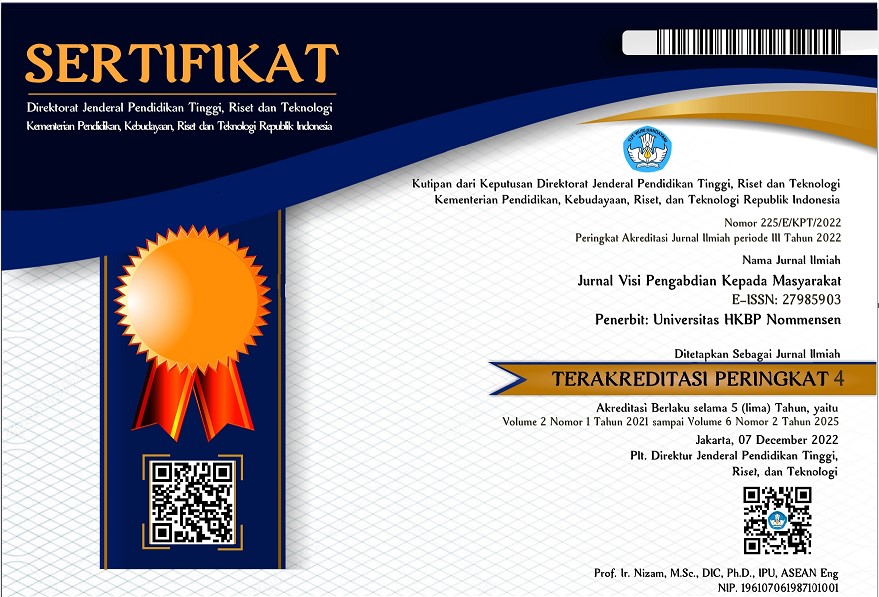Mendorong Inovasi Pendidikan Melalui Integrasi AI Dalam Pengembangan Pertanyaan HOTS
DOI:
https://doi.org/10.51622/pengabdian.v6i1.2627Keywords:
Kecerdasan buatan, HOTS, pelatihan, Chatgpt , GeminiAbstract
This training program aimed to enhance the skills of Tunas Jakasampurna School teachers in developing High Order Thinking Skills (HOTS) questions through the integration of artificial intelligence (AI). The training, involving 35 participants, utilized AI applications such as ChatGPT and Gemini to facilitate efficient question creation. Evaluation results showed a significant improvement in participants' understanding based on the comparison of pre-test and post-test scores. Participants appreciated the interactive approach that combined theoretical learning with hands-on practice. Recommendations include conducting similar training programs regularly with broader coverage and post-training support to ensure the sustainable application of AI in teaching activities.
Downloads
References
Afifah Arifuddin, N., Dwi Amalia, R., & Setyadinsa, R. (n.d.). PELATIHAN INTEGRASI KECERDASAN BUATAN DALAM PENGEMBANGAN BAHAN AJAR INTERAKTIF UNTUK GURU DI
SEKOLAH TUNAS JAKASAMPURNA. https://doi.org/10.31604/jpm.v7i6.2194-2200
Baidoo-anu, D., & Owusu Ansah, L. (2023). Education in the Era of Generative Artificial Intelligence (AI): Understanding the Potential Benefits of ChatGPT in Promoting Teaching and Learning. Journal of AI, 7(1), 52–62. https://doi.org/10.61969/jai.1337500
Bernard, A., & Tichkiewitch, S. (2010). Methods and Tools for Effective Knowledge Life-Cycle-Management. Springer Berlin Heidelberg. https://books.google.co.id/books?id=-xW7cQAACAAJ
Bettayeb, A. M., Abu Talib, M., Sobhe Altayasinah, A. Z., & Dakalbab, F. (2024). Exploring the impact of ChatGPT: conversational AI in education. In Frontiers in Education (Vol. 9). Frontiers Media SA. https://doi.org/10.3389/feduc.2024.1379796
Cardona, M. A., Rodríguez, R. J., & Ishmael, K. (2023). Artificial Intelligence and the Future of Teaching and Learning Insights and Recommendations Artificial Intelligence and the Future of Teaching and Learning. https://tech.ed.gov
DeCastellarnau, A. (2018). A classification of response scale characteristics that affect data quality: a literature review. Quality and Quantity, 52(4), 1523–1559. https://doi.org/10.1007/s11135-017-0533-4
DiGiorgio, A. M., & Ehrenfeld, J. M. (2023). Artificial Intelligence in Medicine & ChatGPT: De-Tether the Physician. Journal of Medical Systems, 47(1), 32. https://doi.org/10.1007/s10916-023-01926-3
Djami, C. B. N., & Kuswandono, P. (2020). Teachers’ Strategies to Implement Higher-Order Thinking Skills in English Instruction. Metathesis: Journal of English Language, Literature, and Teaching, 4(1), 25. https://doi.org/10.31002/metathesis.v4i1.2048
Ekin, S. (2023). Prompt Engineering For ChatGPT: A Quick Guide To Techniques, Tips, And Best Practices. https://doi.org/10.36227/techrxiv.22683919.v2
Ganapathy, M. (2017). Promoting Higher Order Thinking Skills via Teaching Practices. 3L The Southeast Asian Journal of English Language Studies, 23, 75–85. https://doi.org/10.17576/3L-2017-2301-06
Hashem, R., Ali, N., El Zein, F., Fidalgo, P., & Abu Khurma, O. (2024). AI to the rescue: Exploring the potential of ChatGPT as a teacher ally for workload relief and burnout prevention. Research and Practice in Technology Enhanced Learning, 19, 023. https://doi.org/10.58459/rptel.2024.19023
Jebb, A. T., Ng, V., & Tay, L. (2021). A Review of Key Likert Scale Development Advances: 1995–2019. In Frontiers in Psychology (Vol. 12). Frontiers Media S.A. https://doi.org/10.3389/fpsyg.2021.637547
Kohnke, L., Moorhouse, B., & Zou, D. (2023). ChatGPT for Language Teaching and Learning. RELC Journal, 54. https://doi.org/10.1177/00336882231162868
Miao, F., Shiohira, K., Vally, Z., & Holmes, W. (2023). International forum on AI and education Steering AI to empower teachers and transform teaching 5-6 December 2022 Analytical report. http://www.unesco.org/open-access/terms-use-ccbysa-en
Mishra, P., Pandey, C., Singh, U., & Gupta, A. (2018). Scales of Measurement and Presentation of Statistical Data. Annals of Cardiac Anaesthesia, 21, 419–422. https://doi.org/10.4103/aca.ACA_131_18
Montenegro-Rueda, M., Fernández-Cerero, J., Fernández-Batanero, J. M., & López-Meneses, E. (2023). Impact of the Implementation of ChatGPT in Education: A Systematic Review. In Computers (Vol. 12, Issue 8). Multidisciplinary Digital Publishing Institute (MDPI). https://doi.org/10.3390/computers12080153
Oyebola Olusola Ayeni, Nancy Mohd Al Hamad, Onyebuchi Nneamaka Chisom, Blessing Osawaru, & Ololade Elizabeth Adewusi. (2024). AI in education: A review of personalized learning and educational technology. GSC Advanced Research and Reviews, 18(2), 261–271. https://doi.org/10.30574/gscarr.2024.18.2.0062
Pitrella, V., Re, A., Tosto, C., Città, G., Allegra, M., Ottaviano, S., Gentile, M., & Perna, S. (2023). The Role of Artificial Intelligence in Personalized Learn-ing.
Sadeh, I., & Zion, M. (2011). Which Type of Inquiry Project Do High School Biology Students Prefer: Open or Guided? Research in Science Education - RES SCI EDUC, 42, 1–18. https://doi.org/10.1007/s11165-011-9222-9
Published
How to Cite
Issue
Section
Copyright (c) 2024 Nurul Afifah Arifuddin; Rifka Dwi Amalia, Radinal Setyadinsa

This work is licensed under a Creative Commons Attribution 4.0 International License.












